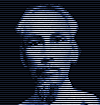Ho Chi Minh
 1890-1969 (born Nguyen Sinh Cung)
Founder of the Vietnamese Communist Party, 1930
1890-1969 (born Nguyen Sinh Cung)
Founder of the Vietnamese Communist Party, 1930
He left his family at an early age and at 21, set out on almost 30 years of traveling around France, England, Russia, China, Thailand and the United States, learning to speak French, English, Russian and Chinese fluently. He settled in Paris where he joined the French Communist Party in 1920 and was later commissioned by Moscow to form a Marxist-Leninist revolutionary organization in French Indochina. He embraced communism, as this seemed to be the best way to establish an independent Vietnam. Early in 1941, he crossed from China into Vietnam where he met with several colleagues with whom he formed the Vietnamese Independence League. He then adopted his last pseudonym, Ho Chi Minh, which translates into "Light-Bringer". During 1946, Ho Chi Minh desperately sought to avoid hostilities but the conflict with the French could not be solved and he began to prepare for war together with General Vo Nguyen Giap, the leader of the North Vietnamese army. The French were eventually overrun and defeated at Dien Bien Phu in May 1954. Ho Chi Minh's position as president of the Democratic Republic of Vietnam was confirmed in the constitution of 1959, but his health was failing and by mid 1960, his role in decision making was mainly ceremonial. Ho Chi Minh was considered to be both a patriot and a Marxist-Leninist who saw no contradiction between the two positions and controversy often stirred in regard to his stance as a patriot or a communist. He was capable of great charm, but also of being ruthless in his tactics to achieve his goals. He was considered a gifted leader with a talent for administration, strategy, and being a motivator in the fight for Vietnamese independence. He did not live to see the fulfillment of his mission; he died on September 2nd 1969, the 24th anniversary of his declaration of independence for Vietnam. |